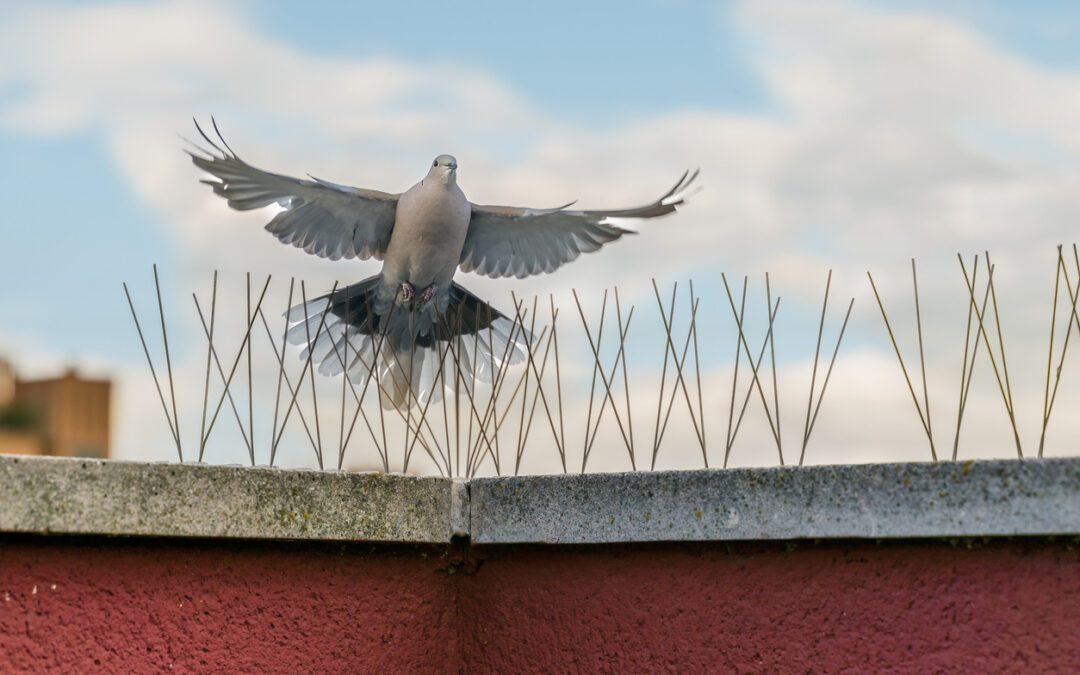
by Pigeon Patrol | Oct 17, 2023 | 4-S Gel Bird repellent, Animal Deterrent Products, Bird Deterrent Products, Bird Law, Bird Netting, Bird Spikes
Psittacosis is an infectious flu-like disease which spreads to humans from infected birds like pigeons. It is caused by the bacteria Chlamydia psittaci.
Though psittacosis appears to be mild in nature, it causes illness and pneumonia or lung infection.
Bird Fancier’s Lung or bird breeder’s lung is a type of hypersensitivity pneumonitis which is caused due to the antigens present in bird droppings.
In this infection, the patient experiences flu-like symptoms like shortness of breath or dyspnea and cough. In many cases, the patient also experiences weight loss, anorexia and extreme weight loss.
When the disease worsens it reduces the lungs’ efficiency over time and leads to pulmonary fibrosis. This can eventually lead to respiratory failure.
In January 2020, two women from Mumbai, aged 38 and 68, underwent lung transplant due to a serious health condition called chronic hypersensitivity pneumonitis which is also called as environment related lung fibrosis.
News reports have said that pulmonologist Unmil Shah and others whom the patients visited over the years found pigeon droppings in the common duct area of their building. One of the patients said her breathing problems started after she moved to her new home.
Pigeon droppings carry over 60 diseases research studies have found.
Pigeon droppings cause respiratory diseases like Histoplasmosis, fungal infection Candidiasis, pulmonary disease called Cryptococcosis which affects the central nervous system at a later stage, St. Louis Encephalitis an inflammation of the nervous system, Salmonellosis or food poisoning, and infections caused by E.Coli present in the bird droppings.
Bird droppings also cause Newcastle disease, a highly contagious disease of birds caused by a paramyxovirus.
Pigeons of the metro cities are well fed. From appeasing celestial bodies to just for fun, metro dwellers love feeding pigeons. This is also the best way to keep the interaction with nature going for those who stay in small congested areas in big cities.
Feeding birds during dawn and dusk is an integral part of metro life.
While maintaining the bare minimum connection with nature is essential and should not be cut down completely, an additional responsibility of discarding the animal wastes is what people need to accept right now.
Those who have got COPD or have asthma allergic problems can develop severe reactions upon exposure to pigeon droppings and their lung conditions can deteriorate, says Dr Rai.
“To stay safe, avoid feeding pigeons so that their population density remains under control. Avoid going to highly risky places where pigeon droppings are. At an individual level, people can keep nets to minimize exposure to pigeon droppings. Those who use ACs should be careful as pigeons tend to remain near it; those areas need to be clear of pigeon droppings,” suggests Dr Rai.
Use a mask to clean pigeon droppings on balconies and windows, he adds.
Since pigeon droppings are known to carry over 60 diseases research studies it is extremely important to keep the surroundings clean, particularly if you have been feeding them for a long time, explains Dr. S.P Rai, Consultant, pulmonary medicine and sleep medicine at Kokilaben Dhirubhai Ambani Hospital, Mumbai.
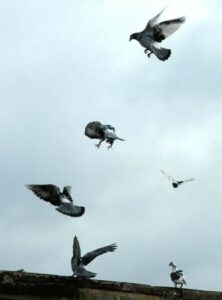
Do not let the droppings accumulate. Use water and a disinfectant to clean the area which is frequented by the avians, he adds.
Source
Pigeon Patrol
Pigeon Patrol Products & Services is the leading manufacturer and distributor of bird deterrent (control) products in Canada. Pigeon Patrol products have solved pest bird problems in industrial, commercial, and residential settings since 2000, by using safe and humane bird deterrents with only bird and animal -friendly solutions. At Pigeon Patrol, we manufacture and offer a variety of bird deterrents, ranging from Ultra-flex Bird Spikes with UV protection, Bird Netting, 4-S Bird Gel and the best Ultrasonic and audible sound devices on the market today.
Canada’s top wholesaler for bird deterrent products for twelve consecutive years.
Contact us at 1- 877– 4– NO-BIRD, (604) 585-9279 or visit our website at https://www.pigeonpatrol.ca/
Bird Gone, Pigeon Gone, Pigeon problems, pigeon spikes, 1-877-4NO-BIRD, 4-S Gel, Bird Control, Pigeon Control, bird repellent, Bird Spikes, sonic bird repellent, stainless steel bird spikes, bird spikes Vancouver, Ultra Sonic Bird Control, Bird Netting, Plastic Bird Spikes, Canada bird spike deterrents, Pigeon Pests, B Gone Pigeon, Pigeon Patrol, pest controller, pest control operator, pest control technician, Pigeon Control Products, humane pigeon spikes, pigeon deterrents, pigeon traps, Pigeon repellents, Sound & Laser Deterrents, wildlife control, raccoon, skunk, squirrel deterrent, De-Fence Spikes, Dragons Den, Pigeon, Pigeon Patrol, Pigeons Roosting, Vancouver Pigeon Control, Bird Spikes, Bird Control, Bird Deterrent, Pigeon Deterrent, Surrey Pigeon Control, Pest, Seagull deterrent Vancouver Pigeon Blog, Birds Inside Home De-fence, Pigeon Nesting, Bird Droppings, Pigeon Dropping, woodpecker control, Keep The Birds Away, Birds/rats, seagull, pigeon, woodpecker, dove, sparrow, pidgeon control, pidgeon problem, pidgeon control, flying rats, pigeon Problems, bird netting, bird gel, bird spray, bird nails, bird guard, Pigeon control, Bird deterrents, Pigeon deterrents, Bird control, solutions, Pigeon prevention, Pigeon repellent, Bird proofing, Pest bird management, Pigeon spikes, Bird netting, Humane bird control, Bird exclusion, Urban bird control, Anti-roosting devices, Pigeon removal, Bird barriers
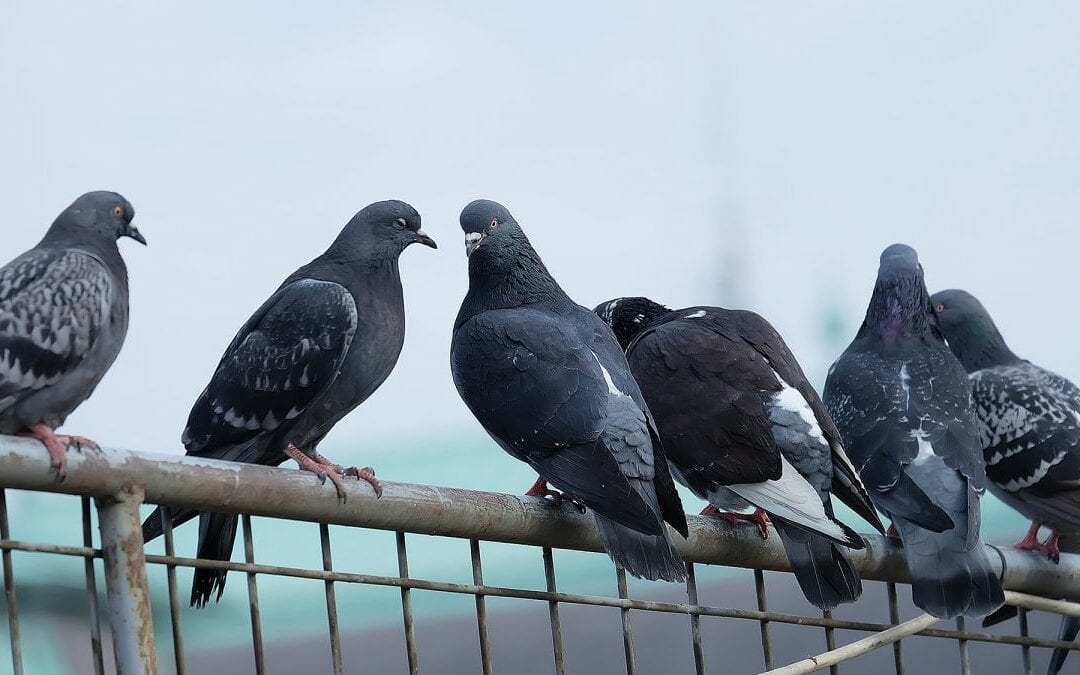
by Pigeon Patrol | Oct 3, 2023 | 4-S Gel Bird repellent, Animal Deterrent Products, Bird Deterrent Products, Bird Law, Bird Netting, Bird Spikes
PETA Supporters to Demand That Retailer Stop Cruel, Ineffective Trapping Program
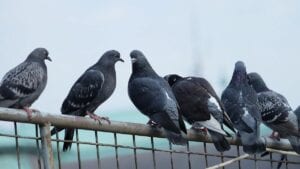
For Immediate Release:
September 6, 2018
Contact:
Brooke Rossi 202-483-7382
Los Angeles – What: Forever 21 has reportedly hired a contractor who has been trapping pigeons at its Los Angeles headquarters, prompting PETA supporters to plan to descend on the building on Friday to urge the retailer to stop trapping the birds immediately and instead take steps to make the area unappealing to them.
When: Friday, September 7, 2 p.m.
Where: Forever 21 Headquarters, 3880 N. Mission Rd. (at the intersection of N. Mission Road and Baldwin Street), Los Angeles
The pigeon problem appears to be related to a food truck that visits the company’s parking lot. PETA has attempted to work with Forever 21, offering myriad suggestions for peacefully coexisting with the birds and discouraging their presence, including simple measures such as keeping trash contained and secured and dumpsters locked, as well as barring workers and patrons from feeding the birds—but so far, it has refused to take these steps. Trapping initiatives actually backfire, because the resultant spike in the food supply accelerates breeding among survivors and inevitable newcomers, and populations then increase.
PETA—whose motto reads, in part, that “animals are not ours to abuse in any way”—points out that trapping initiatives cause animals immense suffering, as they can quickly succumb to stress, exposure, or injuries sustained in frantic attempts to escape.
“Forever 21’s decision to trap pigeons who are simply trying to eke out an existence is cruel, and such initiatives can tear wild families apart, leaving orphaned young to starve,” says PETA Executive Vice President Tracy Reiman. “PETA is calling on the retailer to nix this methodically cruel trapping and put into motion humane coexistence measures instead.”
Source
Pigeon Patrol
Pigeon Patrol Products & Services is the leading manufacturer and distributor of bird deterrent (control) products in Canada. Pigeon Patrol products have solved pest bird problems in industrial, commercial, and residential settings since 2000, by using safe and humane bird deterrents with only bird and animal -friendly solutions. At Pigeon Patrol, we manufacture and offer a variety of bird deterrents, ranging from Ultra-flex Bird Spikes with UV protection, Bird Netting, 4-S Bird Gel and the best Ultrasonic and audible sound devices on the market today.
Canada’s top wholesaler for bird deterrent products for twelve consecutive years.
Contact us at 1- 877– 4– NO-BIRD, (604) 585-9279 or visit our website at https://www.pigeonpatrol.ca/
Bird Gone, Pigeon Gone, Pigeon problems, pigeon spikes, 1-877-4NO-BIRD, 4-S Gel, Bird Control, Pigeon Control, bird repellent, Bird Spikes, sonic bird repellent, stainless steel bird spikes, bird spikes Vancouver, Ultra Sonic Bird Control, Bird Netting, Plastic Bird Spikes, Canada bird spike deterrents, Pigeon Pests, B Gone Pigeon, Pigeon Patrol, pest controller, pest control operator, pest control technician, Pigeon Control Products, humane pigeon spikes, pigeon deterrents, pigeon traps, Pigeon repellents, Sound & Laser Deterrents, wildlife control, raccoon, skunk, squirrel deterrent, De-Fence Spikes, Dragons Den, Pigeon, Pigeon Patrol, Pigeons Roosting, Vancouver Pigeon Control, Bird Spikes, Bird Control, Bird Deterrent, Pigeon Deterrent, Surrey Pigeon Control, Pest, Seagull deterrent Vancouver Pigeon Blog, Birds Inside Home De-fence, Pigeon Nesting, Bird Droppings, Pigeon Dropping, woodpecker control, Keep The Birds Away, Birds/rats, seagull, pigeon, woodpecker, dove, sparrow, pidgeon control, pidgeon problem, pidgeon control, flying rats, pigeon Problems, bird netting, bird gel, bird spray, bird nails, bird guard, Pigeon control, Bird deterrents, Pigeon deterrents, Bird control, solutions, Pigeon prevention, Pigeon repellent, Bird proofing, Pest bird management, Pigeon spikes, Bird netting, Humane bird control, Bird exclusion, Urban bird control, Anti-roosting devices, Pigeon removal, Bird barriers
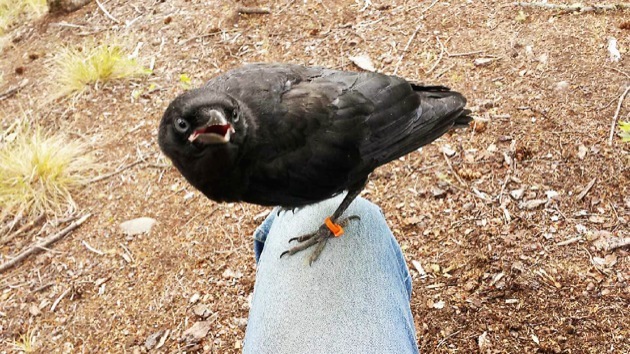
by Pigeon Patrol | Oct 3, 2023 | 4-S Gel Bird repellent, Animal Deterrent Products, Bird Deterrent Products, Bird Law, Bird Netting, Bird Spikes
Kirkland Lake Council has taken another step in trying to control the town’s pigeon problem.
At their meeting of April 16th Council agreed to proceed with purchasing four traps for residents to borrow with deposit. The cost of a pigeon trap is $65 (holds 10-15 pigeons).
In a report to council staff stated “The pigeon population is increasing in the town . Pigeons mate for life and a pair can breed up to 12 fledglings per year. Staff have increasing been receiving calls and emails from residents asking for help with neighbours who are feeding the pigeons, encouraging the flock to flourish and remain in the area.
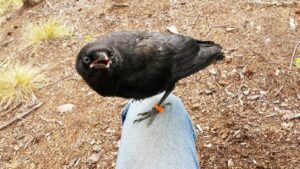
Pigeon feces are highly acidic and so corrosive that it can cut a roof’s average life span in half.
Residents’ properties are being damaged.
Orkin Canada gives the following tips for prevention and control:
Eliminate sources of food, including bird feeders intended for other species
Repair and seal any damage to the exterior of buildings where they can build nests
Place fake/statuettes of predatory birds near ledges
Create an unwelcome environment with loud noises and/or water sprays to scare them away
“Staff also met with the Timiskaming Health Unit) to discuss the health concerns related to pigeons. From their standpoint, pigeons are not a health problem. There would need to be several inches of droppings in a very restricted area in order for it to pose a health concern. They insist that feeding restrictions do help, however the enforcement must be focused on the places they reside (i.e. openings in buildings/structures that encourage roosting).
“In late 2018, a By-law was passed prohibiting residents from feeding the pigeons. The Ontario Provincial Police have been working diligently with the Town to target problem areas and has charged individuals under this By-law as a result. Council has requested that further options be researched by staff and brought to Council for consideration.
““(The) Kirkland Lake Fish and Game Association in Kirkland Lake recommended that we purchase traps that could be lent out to residents for trapping. Individuals trapping the birds require a small game hunting license in order to do so
“Should Council not wish to encourage the killing of pigeons, there is the option of trapping and relocating. Research has told us however that pigeons are capable of returning to their home if they are within a 600 km radius. There is concern as to who will be responsible for bringing the pigeons 600 km away and also, whether the municipality we are bringing the pigeons to will be okay with us relocating them there.
“In staff’s opinion, eradication of the pigeons is recommended. There are a few problem areas that should be resolved immediately in order to reduce the effect the pigeons are having on surrounding neighbours and their property.”
During the discussion Councillor Dennis Perrier stated he has heard from some citizens who have said they do not want the pigeons killed. Perrier added if people do decide to go that route, he hopes it will be done in the most humane way possible.
Source
Pigeon Patrol
Pigeon Patrol Products & Services is the leading manufacturer and distributor of bird deterrent (control) products in Canada. Pigeon Patrol products have solved pest bird problems in industrial, commercial, and residential settings since 2000, by using safe and humane bird deterrents with only bird and animal -friendly solutions. At Pigeon Patrol, we manufacture and offer a variety of bird deterrents, ranging from Ultra-flex Bird Spikes with UV protection, Bird Netting, 4-S Bird Gel and the best Ultrasonic and audible sound devices on the market today.
Canada’s top wholesaler for bird deterrent products for twelve consecutive years.
Contact us at 1- 877– 4– NO-BIRD, (604) 585-9279 or visit our website at https://www.pigeonpatrol.ca/
Bird Gone, Pigeon Gone, Pigeon problems, pigeon spikes, 1-877-4NO-BIRD, 4-S Gel, Bird Control, Pigeon Control, bird repellent, Bird Spikes, sonic bird repellent, stainless steel bird spikes, bird spikes Vancouver, Ultra Sonic Bird Control, Bird Netting, Plastic Bird Spikes, Canada bird spike deterrents, Pigeon Pests, B Gone Pigeon, Pigeon Patrol, pest controller, pest control operator, pest control technician, Pigeon Control Products, humane pigeon spikes, pigeon deterrents, pigeon traps, Pigeon repellents, Sound & Laser Deterrents, wildlife control, raccoon, skunk, squirrel deterrent, De-Fence Spikes, Dragons Den, Pigeon, Pigeon Patrol, Pigeons Roosting, Vancouver Pigeon Control, Bird Spikes, Bird Control, Bird Deterrent, Pigeon Deterrent, Surrey Pigeon Control, Pest, Seagull deterrent Vancouver Pigeon Blog, Birds Inside Home De-fence, Pigeon Nesting, Bird Droppings, Pigeon Dropping, woodpecker control, Keep The Birds Away, Birds/rats, seagull, pigeon, woodpecker, dove, sparrow, pidgeon control, pidgeon problem, pidgeon control, flying rats, pigeon Problems, bird netting, bird gel, bird spray, bird nails, bird guard, Pigeon control, Bird deterrents, Pigeon deterrents, Bird control, solutions, Pigeon prevention, Pigeon repellent, Bird proofing, Pest bird management, Pigeon spikes, Bird netting, Humane bird control, Bird exclusion, Urban bird control, Anti-roosting devices, Pigeon removal, Bird barriers
d nails/bird guard
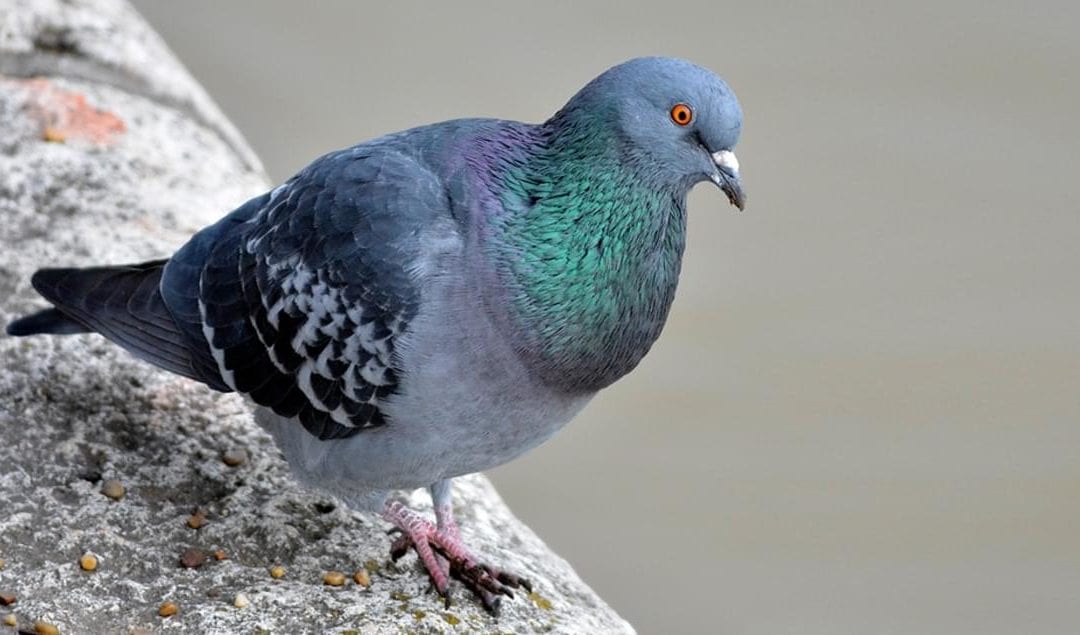
by Pigeon Patrol | Sep 25, 2023 | Bird Deterrent Products, Bird Law, Bird Netting, Bird Spikes, Columbidae, Doves
SOUTH JORDAN — Most people aren’t fond of pigeons. But Boris Majnaric loves them.
Take the bluish-gray bird he named Avalon, the one he brought back from the dead.
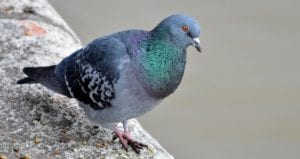
Majnaric found the featherless fledging frozen in his backyard gazebo, eyes closed and not breathing. He took it into his garage and put it on the hood of his still-warm Toyota Avalon. He gave it a warming solution and started CPR. Nothing. And so he prayed.
“Lord, I have to feed the other birds. I’ll be back in 45 minutes,” the 74-year-old retired middle school French teacher recalls saying. “When I came back, she was moving. As far as I’m concerned, she’s a resurrected bird.”
Avalon now lives in a spacious, 384-square-foot, four-room loft in his backyard along with about 200 other pigeons of various colors and varieties. Dozens more “homeless” birds roost in the unique gazebo he had built just for pigeons.
But some of Majnaric’s neighbors and the city don’t share his passion for pigeons.
People in the well-kept neighborhood don’t like all those birds perching on their houses, defecating on their roofs and patios, or turning up dead in their yards. They also say pigeon feed on the ground attracts rats.
South Jordan charged Majnaric last August with three class B misdemeanors related to the size of his flock, banding and registering pigeons and keeping them in a coop. It also filed a court petition to remove his birds and tear down the pigeon paradise.
Majnaric filed a federal lawsuit last month seeking an injunction to stop the city from razing his loft and gazebo and “cruelly” destroying his pigeons.
Majnaric’s attorney, David Pace, said the city agreed Wednesday to postpone a review hearing scheduled for next week in the city case to talk about a settlement.
Under any scenario, Majnaric would have to find a home for all but 40 birds to comply with South Jordan law. He can’t bear the thought of the city removing his pigeons, which he says means sure death.
“The word ‘remove’ makes me sick,” he said. “You don’t use the word remove for God’s birds. You use the word remove for the garbage.”
Majnaric built his house in 1996 and asked the city about laws for raising pigeons. An official directed him to an ordinance that allowed for a “reasonable and manageable” number of fowl on a residential property. Although the law has changed over the years, Majnaric said his house, which abuts a farm filled with sheep, should be grandfathered in.
Neighbors noticed an explosion of pigeons in the area about three years ago and complained to the city, igniting what has become a three-year battle.
Next-door neighbor Kent Baker said he has no ill will toward Majnaric but says he should come into line with the law.
“Every other city in world is trying to get rid of pigeons, and my neighbor decides he should have more. He’s just kind of hoarding pigeons,” he said.
Majnaric’s federal lawsuit is the latest move in the prolonged fight that he said has cost him $20,000 and caused him heart problems. A jazz saxophonist and clarinetist, he said the fight has sapped his ability to practice and write music.
South Jordan charged Majnaric with animal nuisance/disturbing neighborhood and land use regulations in October 2012. He was found not guilty of the nuisance charge after a trial in 3rd District Court but was cited for a use violation. Judge Barry Lawrence ordered him to bring his flock into compliance with the city ordinance.
The judge also found that in addition to Majnaric’s birds, some “homeless” pigeons took up residence in the gazebo. He ordered a veterinarian to set up a management plan to care for the additional pigeons. Majnaric said he continues to abide by those guidelines, including closing many of the nesting boxes in the gazebo. He also isn’t supposed to feed birds outside the coop.
But South Jordan spokesman Chip Dawson said Majnaric hasn’t complied with the court orders, which has complicated the issue for the city.
“Obviously, the city feels like there’s a limit to how many we can accommodate,” he said.
Last year, South Jordan considered an ordinace patterned after one in Cottonwood Heights to increase the number of pigeons allowed to 220, but it failed.
Majnaric is trying to arrange for a Box Elder County pigeon fancier to pick up about 100 of his birds next week. But Majnaric said pigeons roosting at a nearby apartment complex and recently razed barn will move in within a few days — something he said he can’t control.
Dawson said the city does not ascribe those random birds to Majnaric.
Majnaric said he’s raising pigeons to fulfill a childhood dream. His parents gave him two pigeons in his native Croatia when he was 12 years old. He said he cried when they died.
When he retired, pigeons became his life.
One is a look-alike to a gray and brown bird his parents gave him. He named it Delnice, after his hometown. He feeds his flock twice a day and keeps medicine on hand to heal sick and wounded birds. Veterinarian Martin Orr describes him as a compassionate caregiver with a deep sense of what pigeons need.
“I think the birds love it here. And I love them, too,” Majnaric said. “They’re my best friends.”
Pigeon Patrol
Pigeon Patrol Products & Services is the leading manufacturer and distributor of bird deterrent (control) products in Canada. Pigeon Patrol products have solved pest bird problems in industrial, commercial, and residential settings since 2000, by using safe and humane bird deterrents with only bird and animal -friendly solutions. At Pigeon Patrol, we manufacture and offer a variety of bird deterrents, ranging from Ultra-flex Bird Spikes with UV protection, Bird Netting, 4-S Bird Gel and the best Ultrasonic and audible sound devices on the market today.
Canada’s top wholesaler for bird deterrent products for twelve consecutive years.
Contact us at 1- 877– 4– NO-BIRD, (604) 585-9279 or visit our website at https://www.pigeonpatrol.ca/
Bird Gone, Pigeon Gone, Pigeon problems, pigeon spikes, 1-877-4NO-BIRD, 4-S Gel, Bird Control, Pigeon Control, bird repellent, Bird Spikes, sonic bird repellent, stainless steel bird spikes, bird spikes Vancouver, Ultra Sonic Bird Control, Bird Netting, Plastic Bird Spikes, Canada bird spike deterrents, Pigeon Pests, B Gone Pigeon, Pigeon Patrol, pest controller, pest control operator, pest control technician, Pigeon Control Products, humane pigeon spikes, pigeon deterrents, pigeon traps, Pigeon repellents, Sound & Laser Deterrents, wildlife control, raccoon, skunk, squirrel deterrent, De-Fence Spikes, Dragons Den, Pigeon, Pigeon Patrol, Pigeons Roosting, Vancouver Pigeon Control, Bird Spikes, Bird Control, Bird Deterrent, Pigeon Deterrent, Surrey Pigeon Control, Pest, Seagull deterrent Vancouver Pigeon Blog, Birds Inside Home De-fence, Pigeon Nesting, Bird Droppings, Pigeon Dropping, woodpecker control, Keep The Birds Away, Birds/rats, seagull, pigeon, woodpecker, dove, sparrow, pidgeon control, pidgeon problem, pidgeon control, flying rats, pigeon Problems, bird netting, bird gel, bird spray, bird nails, bird guard, Pigeon control, Bird deterrents, Pigeon deterrents, Bird control, solutions, Pigeon prevention, Pigeon repellent, Bird proofing, Pest bird management, Pigeon spikes, Bird netting, Humane bird control, Bird exclusion, Urban bird control, Anti-roosting devices, Pigeon removal, Bird barriers
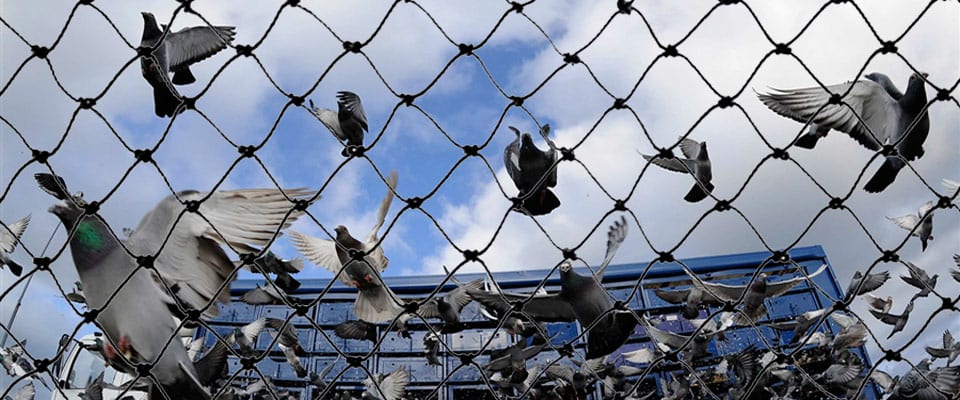
by Pigeon Patrol | Sep 25, 2023 | 4-S Gel Bird repellent, Animal Deterrent Products, Bird Deterrent Products, Bird Law, Bird Netting, Bird Spikes
First, let me say that, unless you are up on the roof actually shoveling pigeon droppings, your risk of catching a disease from them is slim. Pigeons definitely can transmit diseases through their droppings, but that usually only happens in specific and rather uncommon situations involving large accumulations of droppings.
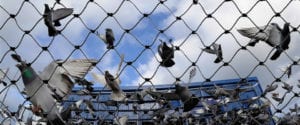
HISTOPLASMOSIS IS RARE BUT CAN BE SERIOUS
The pigeon-transmitted disease to be most concerned about is histoplasmosis, a fungal disease that affects the human respiratory tract and in rare cases, can be fatal. Histoplasmosis is spread to people when they breathe in fungal spores from pigeon droppings that have been disturbed, usually during cleaning or construction activities. The actual incidence of histoplasmosis is hard to determine since most people with the disease have flu-like symptoms or no symptoms at all.
Histoplasmosis spores grow on piles of bird or bat droppings that have been accumulating for years. Lesser amounts of droppings on exposed surfaces that are cleaned up periodically pose little risk. Certain workers like chimney cleaners, bridge inspectors, building renovators, and even pest control technicians are at some risk when working around accumulated pigeon droppings. These workers should always use precautions and wear respirators when working in roost sites.
DROPPINGS AREN’T THE ONLY CONCERN WITH PIGEONS
This doesn’t mean that having pigeons roosting on your building is a good thing. If your manager isn’t concerned about the disease risk associated with pigeons, he might need to be informed about the other risks associated with pigeon droppings. Droppings are unsightly and odorous, they deteriorate surfaces like roofs and concrete increasing maintenance costs, they kill vegetation below, they pit the paint on cars below, and they can be slippery for pedestrians, which means a liability risk for the property.
There are lots of ways to keep pigeons off of and away from buildings. Have your manager give Colonial Pest a call for a complete inspection and evaluation.
Source
Pigeon Patrol Products & Services is the leading manufacturer and distributor of bird deterrent (control) products in Canada. Pigeon Patrol products have solved pest bird problems in industrial, commercial, and residential settings since 2000, by using safe and humane bird deterrents with only bird and animal -friendly solutions. At Pigeon Patrol, we manufacture and offer a variety of bird deterrents, ranging from Ultra-flex Bird Spikes with UV protection, Bird Netting, 4-S Bird Gel and the best Ultrasonic and audible sound devices on the market today.
Canada’s top wholesaler for bird deterrent products for twelve consecutive years.
Contact us at 1- 877– 4– NO-BIRD, (604) 585-9279 or visit our website at https://www.pigeonpatrol.ca/
Bird Gone, Pigeon Gone, Pigeon problems, pigeon spikes, 1-877-4NO-BIRD, 4-S Gel, Bird Control, Pigeon Control, bird repellent, Bird Spikes, sonic bird repellent, stainless steel bird spikes, bird spikes Vancouver, Ultra Sonic Bird Control, Bird Netting, Plastic Bird Spikes, Canada bird spike deterrents, Pigeon Pests, B Gone Pigeon, Pigeon Patrol, pest controller, pest control operator, pest control technician, Pigeon Control Products, humane pigeon spikes, pigeon deterrents, pigeon traps, Pigeon repellents, Sound & Laser Deterrents, wildlife control, raccoon, skunk, squirrel deterrent, De-Fence Spikes, Dragons Den, Pigeon, Pigeon Patrol, Pigeons Roosting, Vancouver Pigeon Control, Bird Spikes, Bird Control, Bird Deterrent, Pigeon Deterrent, Surrey Pigeon Control, Pest, Seagull deterrent Vancouver Pigeon Blog, Birds Inside Home De-fence, Pigeon Nesting, Bird Droppings, Pigeon Dropping, woodpecker control, Keep The Birds Away, Birds/rats, seagull, pigeon, woodpecker, dove, sparrow, pidgeon control, pidgeon problem, pidgeon control, flying rats, pigeon Problems, bird netting, bird gel, bird spray, bird nails, bird guard, Pigeon control, Bird deterrents, Pigeon deterrents, Bird control, solutions, Pigeon prevention, Pigeon repellent, Bird proofing, Pest bird management, Pigeon spikes, Bird netting, Humane bird control, Bird exclusion, Urban bird control, Anti-roosting devices, Pigeon removal, Bird barriers
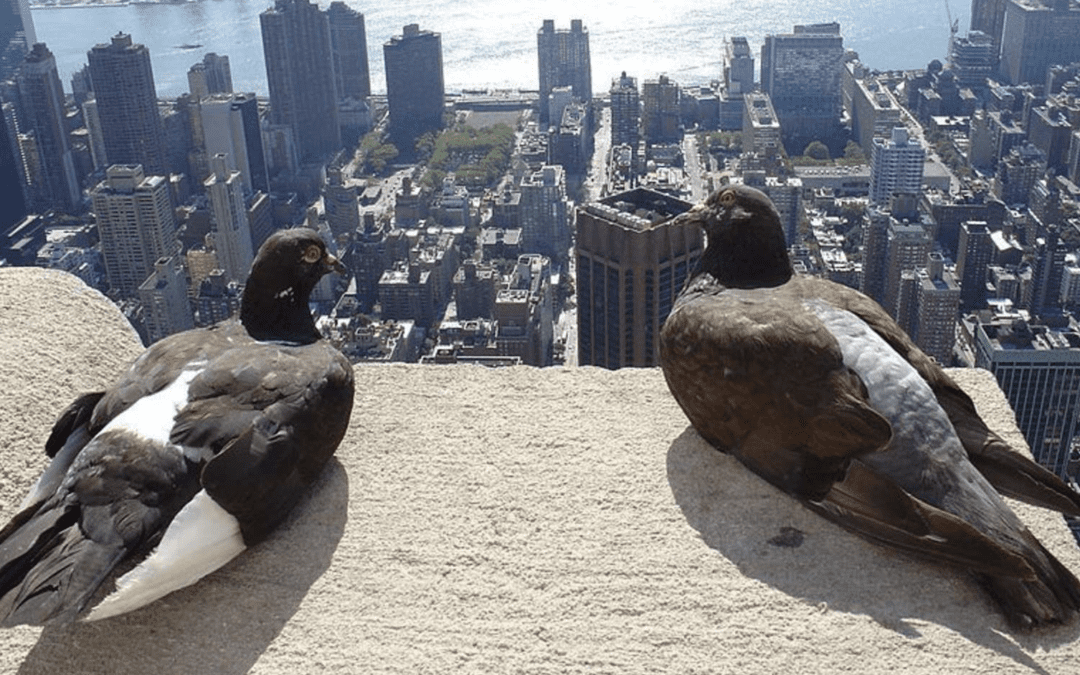
by Pigeon Patrol | Sep 18, 2023 | 4-S Gel Bird repellent, Animal Deterrent Products, Bird Deterrent Products, Bird Law, Bird Netting, Bird Spikes
Being that pigeons are indiscriminate eliminators of all kind of waste they are always seen gathering around the areas where people live. This bird normally splatters droppings and always drops liquid wherever they traveled to. More so, pigeons do not care about cleanliness and always contaminate water. The wastes from these birds are seen to be corrosive which affect everywhere there is their droppings. But the problem with Rhode Island pigeon has resulted to reason why people do not want to have the birds around them.
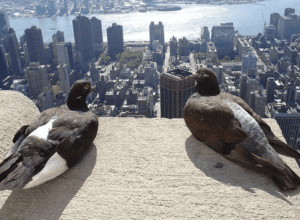
Some the Ways to Get Pigeon Out Of Your Attic
There are many ways to get pigeons out of your attic but the Rhode Island method you applied will determine the result you will get. One of the most effective ways to remove pigeon from your attic is by spicing things up by adding some spices on your attic. Really, whole pigeons do not like spices and sprinkling cayenne pepper, cinnamon pepper and other will help to scare pigeon away from attic. You have to ensure that you are generous with the spices and repeat the application of the spices.
Get Pigeon Out Of Your Attic by Using String Tied One End to Another
Pigeon always like to relax when they gather in a particular place. For that reason, preventing them from getting a well relaxed place will prevent them from occupying a place in your attic. For that reason, what you simply need do in order to avoid Rhode Island pigeon from taking a place in your attic is to use string and tie one to another of a sport where the pigeons normally like to roost. This will prevent the birds from finding a place to balance themselves while they gather in your attic. You can easily do this using waterproof string and you will achieve the result you have been expecting.
Remove Pigeon Out Of Your Attic Using Sticky Chemicals
Pigeons are among the birds that normally love to feel comfortable where they love to perch. For that reason, if you can make it difficult for them to enjoy comfort in a place they gather you will be able to get rid of pigeon from your attic. Simply by spraying sticky chemicals that will make it difficult for the Rhode Island birds to perch you will get the birds away. You will easily buy sticky chemicals you need to scare birds away from your home when you check out the stores near your area.
Use Anti-Roosting Spike Strips to Get Pigeon Out Of Your Attic
Apart from applying sticking chemical to your attic when you want to scare Rhode Island pigeon away from your attic, you can also do same with anti-roosting spike strips. You can easily buy the spike stripes on the hardware store near your street. The setup method for the anti-roosting spikes strips will depend on the manufacturer. For that reason, you have to find out more about the setup method of your anti-roosting spike strip when you consult the manufacturer of the product. You can equally learn the set up tips from the Providence hardware store where you buy the spike strips.
Repel Pigeon with the Use of Natural Pigeon Repellent with Ease
There are natural and store-bought pigeon repellents which you can use to get pigeon away from your attic without passing through stress. One of the natural ways to repel pigeon from your attic is to spray water on the pigeons using water from the garden hose. The Rhode Island pigeons will be uncomfortable to stay in your Providence attic when you frequently spray the birds with water out of your garden hose. You can also exclude pigeon from getting into y our attic by repairing your home and also rebuilding your fences. There are also other kinds of repellent you can easily use to get pigeon away from your home and attic but most of the methods are not really safe. That is why you have to make sure that you select the most suitable and most efficient way to repel the Rhode Island pigeons that have been affecting your home.
Eliminate Food Sources to Get Pigeons Out Of Your Attic
Food sources are among the things that can easily attract Providence pigeons to your attic. For that reason, if you want to get pigeons out of your attic one of the best ways to do that is through removal of food sources. The food sources include grass, barriers as well as cat and dog foods. For that reason, you are going to get the Rhode Island pigeon out of your attic by simply removing all the things that will attract pigeons from your home. These and more are the easier way to prevent pigeon from entering and getting into your home at any point in time.
Source
Pigeon Patrol Products & Services is the leading manufacturer and distributor of bird deterrent (control) products in Canada. Pigeon Patrol products have solved pest bird problems in industrial, commercial, and residential settings since 2000, by using safe and humane bird deterrents with only bird and animal -friendly solutions. At Pigeon Patrol, we manufacture and offer a variety of bird deterrents, ranging from Ultra-flex Bird Spikes with UV protection, Bird Netting, 4-S Bird Gel and the best Ultrasonic and audible sound devices on the market today.
Canada’s top wholesaler for bird deterrent products for twelve consecutive years.
Contact us at 1- 877– 4– NO-BIRD, (604) 585-9279 or visit our website at https://www.pigeonpatrol.ca/
Bird Gone, Pigeon Gone, Pigeon problems, pigeon spikes, 1-877-4NO-BIRD, 4-S Gel, Bird Control, Pigeon Control, bird repellent, Bird Spikes, sonic bird repellent, stainless steel bird spikes, bird spikes Vancouver, Ultra Sonic Bird Control, Bird Netting, Plastic Bird Spikes, Canada bird spike deterrents, Pigeon Pests, B Gone Pigeon, Pigeon Patrol, pest controller, pest control operator, pest control technician, Pigeon Control Products, humane pigeon spikes, pigeon deterrents, pigeon traps, Pigeon repellents, Sound & Laser Deterrents, wildlife control, raccoon, skunk, squirrel deterrent, De-Fence Spikes, Dragons Den, Pigeon, Pigeon Patrol, Pigeons Roosting, Vancouver Pigeon Control, Bird Spikes, Bird Control, Bird Deterrent, Pigeon Deterrent, Surrey Pigeon Control, Pest, Seagull deterrent Vancouver Pigeon Blog, Birds Inside Home De-fence, Pigeon Nesting, Bird Droppings, Pigeon Dropping, woodpecker control, Keep The Birds Away, Birds/rats, seagull, pigeon, woodpecker, dove, sparrow, pidgeon control, pidgeon problem, pidgeon control, flying rats, pigeon Problems, bird netting, bird gel, bird spray, bird nails, bird guard, Pigeon control, Bird deterrents, Pigeon deterrents, Bird control, solutions, Pigeon prevention, Pigeon repellent, Bird proofing, Pest bird management, Pigeon spikes, Bird netting, Humane bird control, Bird exclusion, Urban bird control, Anti-roosting devices, Pigeon removal, Bird barriers












